New Obama EPA Regional Administrator Plants a Flag in NJ
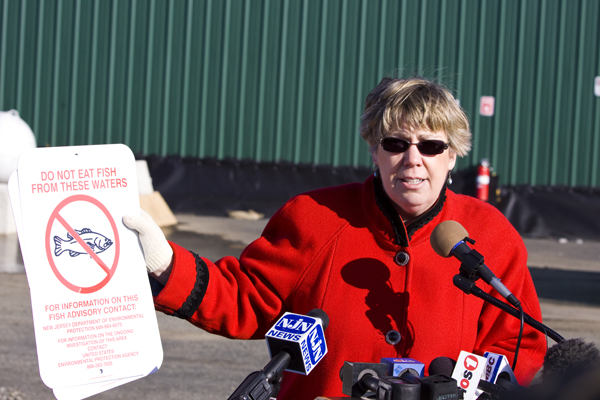
Judith Enck, EPA Region II Regional Administrator shows fish consumption warning of PCB toxic contamination of fish in Bound Brook.
Enck’s high profile visit provides an early pushback to Christie’s campaign statements regarding EPA oversight.
[Updates below]
In her first week on the job, new Obama EPA Region II Administrator Judith Enck traveled to New Jersey. Enck visited the Cornell Dubilier Superfund site in South Plainfield, NJ where $30 million in American Recovery and Reinvestment Act funds were allocated to cleanup the site and benefit the community.
Cornell Dubilier Electronics, Inc. operated at the site from 1936 to 1962, manufacturing electronic parts and components, including capacitors. The company dumped material contaminated with polychlorinated biphenyls (PCBs) and other hazardous substances directly onto site soils during its operations. EPA has detected PCBs in the, ground water, soil and in building interiors at the industrial park and at nearby residential, commercial and municipal properties.
EPA also has detected PCBs in the surface water and sediments of the Bound Brook, which crosses the site’s southeast corner. A pre-1991 investigation conducted by the New Jersey Department of Environmental Protection in the vicinity of the former CDE facility revealed significant ground water contamination consisting mainly of the volatile organic compounds, trichloroethylene and tetrachloroethylene. Due to widespread contamination, residential wells in the area were closed and residents hooked up to a city water supply. In 1998, EPA began cleaning the interior of homes near the site that contained PCBs in household dust and potentially responsible parties at the site removed PCB-contaminated soil from homes.
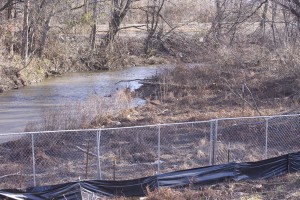
Bound Brook, a tributary to the Raritan, has been poisoned by PCBs and other chemicals migrating off the site. Fish have some of the highest PCB levels in NJ and are unsafe to eat.
Enck spoke about progress being made in cleaning up the site. Chemical pollutants have migrated off site into nearby homes and Bound Brook, a tributary to the Raritan River. As a result, fish are highly contaminated with unsafe levels of PCBs and should not be eaten.
The event, while designed to highlight the Obama Administration’s environmental and economic revitalization efforts, also sent a strong message to the incoming Administration of Governor elect Chris Christie, who has already challenged EPA oversight and threatened a moratorium on regulations.
That message is: EPA will not only be investing significant funds in environmental cleanup in NJ, but will be overseeing federal environmental laws and holding the State accountable to implement federally delegated and/or funded programs.
EPA provides millions of dollars to NJ DEP to administer federally delegated clean air, clean water, safe drinking water, toxic site cleanup, and hazardous waste management programs. That funding, in addition to federal law mandates, provides EPA Region II with tremendous leverage over NJ DEP.
In August 2009, EPA issued a scathingly critical audit of NJ DEP’s performance (See: EPA AUDIT RIPS NEW JERSEY DEP PERFORMANCE – Corrective Actions Never Implemented for Toxic, Wetlands and Other Programs.
In June 2008, the EPA Inspector General issued a highly critical report of NJ DEP that prompted EPA Region II to take over cases that had been mismanged by NJDEP. (See: EPA REPORT BLASTS NEW JERSEY TOXIC CLEAN-UPS -State Failures to Enforce Law Lead to Worst Delays in the Country
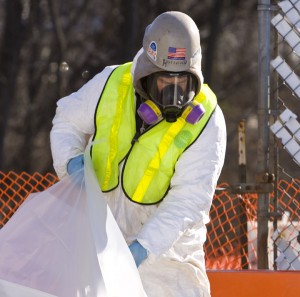 NJ recently privatized its state toxic site cleanup program, so Enck’s early focus on the Superfund program is a clear indication that EPA will be looking closely at how NJ implements the privatization scheme.
NJ recently privatized its state toxic site cleanup program, so Enck’s early focus on the Superfund program is a clear indication that EPA will be looking closely at how NJ implements the privatization scheme.
Enck’s high profile visit provides an early pushback to Christie’s campaign statements regarding EPA oversight. In October, Christie laid down the gauntlet:
“I’ve got a feeling that you will see, come January 2010, a lot of battles between the Christie administration DEP and the Obama administration EPA.” (watch YouTube)
Just days after his election, Christie promised to impose a moratorium on regulations, to make it “easier for business”, an act which is certain to raise issues regarding compliance with federal EPA requirements. Recently, EPA used federal power to block implementation of Governor McGreevey’s so called “Fast Track“ environmental permit law and to scale back the scope of Corzine’s “Permit Extension Act”.
EPA Region II oversees the states of NY and NJ and the territory of Puerto Rico. Enck’s is the first EPA Region II Administrator in recent memory that is not from NJ, so she is not beholden to any NJ players which gives her a stronger degree of political independence. Enck was a member of former NY Governor Elliot Spitzer’s team and was with Spitzer when he served two terms as NY Attorney General. Enck helped make environmental enforcement a priority for Spitzer and comes highly praised by both NY and NJ environmental communities.
Enck’s boss, EPA Administrator Lisa Jackson was previously NJDEP Commissioner and Chief of Staff to Governor John Corzine. Jackson is recused and can not participate in EPA decisions in NJ. This provides Enck more autonomy and control in NJ within the EPA chain of command, yet it also requires that she avoid any appearance of favoritism in NJ.
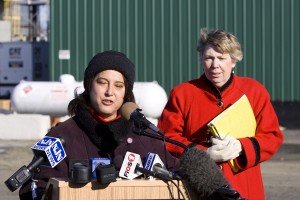
Lisa Plevin, Senator Frank Lautenberg’s office
The site visit was coordinated with remarks by South Plainfield Mayor Charles Butrico and Senator Frank Lautenberg’s Office. Importantly, there was a significant presence of members of State and local environmental groups and media. So, overall, this was a very well planned, well executed, and successful event for the new EPA RA.
Enck will face challenges in holding NJ DEP’s feet to the fire. It is clear that she is up to that task, and has made oversight of NJ a priority.
We have written about and will be closely following these development. (some fishy history here)
[Update #1: I was very disappointed to read this quote from Enck – recall that even Lisa Jackson- in a reply to a question from Chairwoman Boxer – explicitly repudiated privatization of toxic site cleanup during her EPA confirmation hearing. Let’s hope she made it before being adequately briefed:
Enck was non-committal about New Jersey’s decision to license private consultants to perform investigations and remediations for clean-up projects, saying she has not seen the details. But she said the economy could force some practical concessions.
“We may have to do some things differently than in the past because of the budget crisis that’s facing our states,” she said.
Here is my briefing note to Enck in response:
Hi – I was disturbed by a quote reported by Newsroom NJ story regarding EPA oversight of NJ LSP and other programs in light of the current economic crisis:
http://www.newjerseynewsroom.com/science-updates/federal-stimulus-funds-could-hasten-cleanup-at-south-plainfield-superfund-site#yvCommentSo I thought I’d take this opportunity to give you a little background on this set of issues:
1. During January 2009 US Senate Confirmation hearings for US EPA Administrator, Lisa Jackson was asked point blank whether she would bring to EPA the LSP or privatization program she supported in NJ.
Jackson repudiated privatization – here’s an excerpt of Jackson’s testimony regarding NJ’s privatized “Licensed Site Professional” (LSP) toxic site program:
Question by Committee Chair Senator Barbara Boxer:
Q: Please provide “your views on polluters self certifying that property is clean (@ time 3:26:45)
A: Lisa Jackson:
“I don’t believe that process [i.e. private certification, as in LSP] has merit at the federal level” (@ time 3:42:43)
Chairman Boxer confirms that Jackson has rejected privatization at EPA and removes any ambiguity at time 3:43:03 by saying:
Q: Boxer: “you don’t anticipate and you do not expect to allow private consultants to certify sites as clean?”
A: Lisa Jackson: “NO”
Watch CSPAN video of Jackson testimony here:
http://www.c-span.org/Watch/watch.aspx?MediaId=Congress-A-143172. The EPA Inspector General has analyzed the claim that lack of staff resources at DEP was cause of backlogs and lack of progress in site remediation. Here is relevant EPA IG finding:.
“Claims about New Jersey’s overwhelming workload were brought to our attention during the evaluation. At that time, we requested documentation from NJDEP to support this workload challenge. We specified that we would need evidence that spanned the 20 year period since these sites were listed on the NPL. NJDEP did not provide this information.”(@ page 11)
Read the EPA IG Report here:
Improved Controls Would Reduce Superfund Backlogs
http://www.epa.gov/oig/reports/2008/20080602-08-P-0169.pdfWe are very concerned that some are using the economic crisis to justify environmental rollbacks. I urge you not to legitimize or be influenced by this political manipulation.
Bill Wolfe
[Update #2 – click for NJN News coverage – starts at minute 17. RA Enck is asked key questions about NJ LSP program & Christie moratorium
Courier/Home News Tribune: South Plainfield gets $30 million to clean up former industrial site
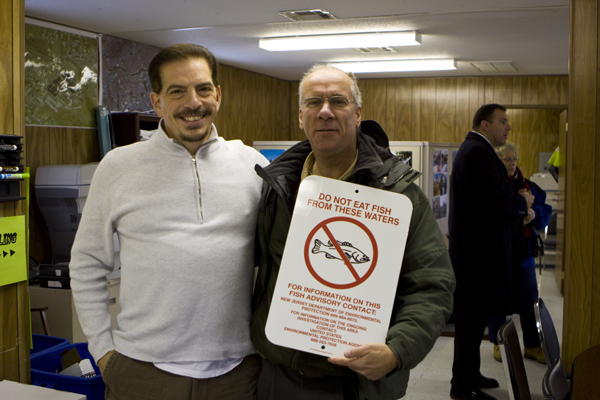
Bob Spiegel (L) Edison Wetlands Assc. has done lots of work on the Cornell Dubilier site. Bill Wolfe (R) Director of NJ PEER, has a history on the fish consumption advisory issue.